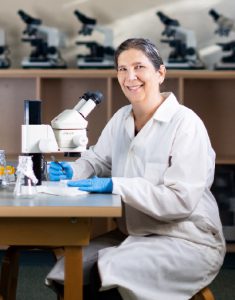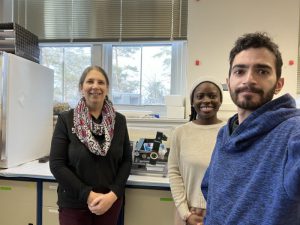 Dr. Tamara Franz-Odendaal, a Professor of Biology and researcher at Mount Saint Vincent University, has recently received approximately $500,000 in research grants to support her groundbreaking work on the impact of space travel on the skeleton.
Dr. Tamara Franz-Odendaal, a Professor of Biology and researcher at Mount Saint Vincent University, has recently received approximately $500,000 in research grants to support her groundbreaking work on the impact of space travel on the skeleton.
This funding includes $150,000 from the Canadian Space Agency (CSA), a $320,000 Infrastructure grant from the Canada Foundation for Innovation and the John R. Evans Leaders Fund (CFI-JEFL), matching funds from Research NS, and in-kind support from MSVU. Additional funding from an NSERC Discovery Grant ($50 000/year) also supports this research.
Dr. Franz-Odendaal’s research focuses on the critical issue of bone loss caused by microgravity (i.e. the virtual absence of gravity). This problem is particularly important for astronauts who may experience a decrease of up to 10% in bone mineral density after spaceflights. It’s an effect that increases bone fragility and raises the risk of fractures. However, the mechanisms behind microgravity-induced bone loss are still not well understood.
Notably, Dr. Franz-Odendaal’s research is the only initiative in Canada dedicated to studying the effects of microgravity on the skeleton in an animal model.
With her new funding, Dr. Franz-Odendaal will expand upon her previous research in this area which began in 2020. In her earlier work, Dr. Franz-Odendaal and her team optimized the methodology for understanding how space travel affects our skeletons. An initial grant from the Canadian Space Agency led to valuable insights into the overall impacts of microgravity on the skeletal structure, while the current funding will enable Dr. Franz-Odendaal to delve deeper into the complex cellular and molecular mechanisms responsible for these effects.
 During the grant period from 2023-2025, Dr. Franz-Odendaal and her team, including research assistants Juan David Carvajal Agudelo and Tracy Apienti (pictured at right), will utilize a Random Positioning Machine (RPM), a cutting-edge piece of equipment recently imported from Germany and designed by the European Space Agency; this is the only one of its kind in Atlantic Canada. Check out the exciting arrival of the instrument here.
During the grant period from 2023-2025, Dr. Franz-Odendaal and her team, including research assistants Juan David Carvajal Agudelo and Tracy Apienti (pictured at right), will utilize a Random Positioning Machine (RPM), a cutting-edge piece of equipment recently imported from Germany and designed by the European Space Agency; this is the only one of its kind in Atlantic Canada. Check out the exciting arrival of the instrument here.
“The RPM rotates the sample continuously, creating an almost zero-gravity (a microgravity) environment, allowing us to mimic the conditions experienced in space right here on Earth,” said Dr. Franz-Odendaal. “Instead of conducting expensive experiments in space, we replicate the environment using the RPM. This allows us to gain insights into the effects of microgravity on bone development without the constraints of space travel.”
Conducting this research in her Bone Development Laboratory at MSVU, Dr. Franz-Odendaal uses zebrafish larvae to investigate the cellular and molecular processes involved in microgravity-induced bone loss. Zebrafish, which share skeletal development traits with humans, are well-suited to this type of research.
Emphasizing the importance of collaboration, Dr. Franz-Odendaal said, “Juan and Tracy, the two research assistants involved, are eager to train undergraduate students in our work, providing opportunities for them to actively participate in the ongoing research.” MSVU undergraduate students are currently being recruited to join the research team.
This research holds significance not only for space exploration but also for understanding various human disorders where lower amounts of bone are formed. According to Dr. Franz-Odendaal, “The more we understand how cells interact and communicate to cause these results, the better we can improve targeted therapies to address bone disorders in humans (such as osteoporosis).”
Congratulations, Dr. Franz-Odendaal on your recent funding awards!